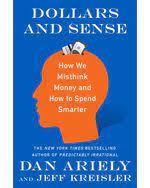9 Money Lessons from Dollars and Sense
Learn 9 money lessons from Dollars and Sense that will help you become a millionaire. Discover how to avoid money mistakes, value your efforts, and use effort language to sell your services.

Clint Murphy
I simplify psychology, success and money by sharing advice from millionaires, expert authors and my life.

-
If you want to be a millionaire,
— Clint Murphy (@IAmClintMurphy) June 1, 2023
You need to avoid money mistakes.
Here's 9 Money Lessons from Dollars and Sense: pic.twitter.com/72W0Dm9drY -
• Fairness Value
— Clint Murphy (@IAmClintMurphy) June 1, 2023
What's worth more:
1. A locksmith whos done in 10 minutes
2. A locksmith who takes 3 hours
Your brain is wired to tie the value to the effort put in.
It means, your brain is wired to value the poor locksmith, not the experienced one.
Sell your efforts. -
• Effort Language
— Clint Murphy (@IAmClintMurphy) June 1, 2023
Effort language is one of the ways you can use to sell your efforts.
Here's the language people use:
• Artisinal
• Handcrafted
• Fair trade organic
This language implies significant effort, which gets you to take more money out of your jeans. -
• Relative Value
— Clint Murphy (@IAmClintMurphy) June 1, 2023
You don't always have clear indicators of value.
When this happens, you make choices on the relative values.
Would you rather make $150k when your neighbors make $300k or
Would you rather make $80k when your neighbors make $50k?
Most choose 80k. A mistake. -
• Sunk Costs
— Clint Murphy (@IAmClintMurphy) June 1, 2023
Once you've invested in something,
You shouldn't think about how much you've already invested in your:
• Job
• Stock
• Home
• Career
• Relationship
Each decision should be based on what the best path forward is, not the past investments made. -
• Positive Pain of Paying
— Clint Murphy (@IAmClintMurphy) June 1, 2023
The timing of your payment can influence how you enjoy an event.
It can also determine whether you're more likely to spend money.
If you want to enjoy your vacation, pay for it as far in advance as possible and make it all-inclusive. -
• Negative Pain of Paying
— Clint Murphy (@IAmClintMurphy) June 1, 2023
You can use the pain of paying to decrease your spending by focusing on the negative pain.
For example, don't use gift cards or store programs, which lower the friction and pain of paying.
If you want to lower your spend, PAY in CASH. -
• Price Anchors
— Clint Murphy (@IAmClintMurphy) June 1, 2023
An anchor price can be any figure you associate with your decision.
Anchoring shows the importance of early decisions or pricing cues, which establish a value in your head.
For example, does a crossed-out $1,499 beside a $999 price truly indicate savings? -
• Opportunity Cost
— Clint Murphy (@IAmClintMurphy) June 1, 2023
What are you giving up when you buy something?
It's the financial equivalent, When you say YES to something, what are you saying NO to?
When you buy a pair of shoes, are you saying no to a copywriting course?
Always ask, what am I saying no to? -
• Decoy Options
— Clint Murphy (@IAmClintMurphy) June 1, 2023
They always get us with this one.
You're given three options:
• Print - $125
• Digital only - $59
• Print + Digital - $125
By offering a decoy "Print Only", buyers increased the purchase of Print + Digital from 32% to 84%.
Beware the decoy, my friends! -
This thread was based on the book Dolalrs and Sense and the book club conversation we had on the Choose FI Podcast.
— Clint Murphy (@IAmClintMurphy) June 1, 2023
I had a blast talking with my friend @bradchoosefi on the Podcast.
You can have a listen here:https://t.co/ksWCLyPNmJ
